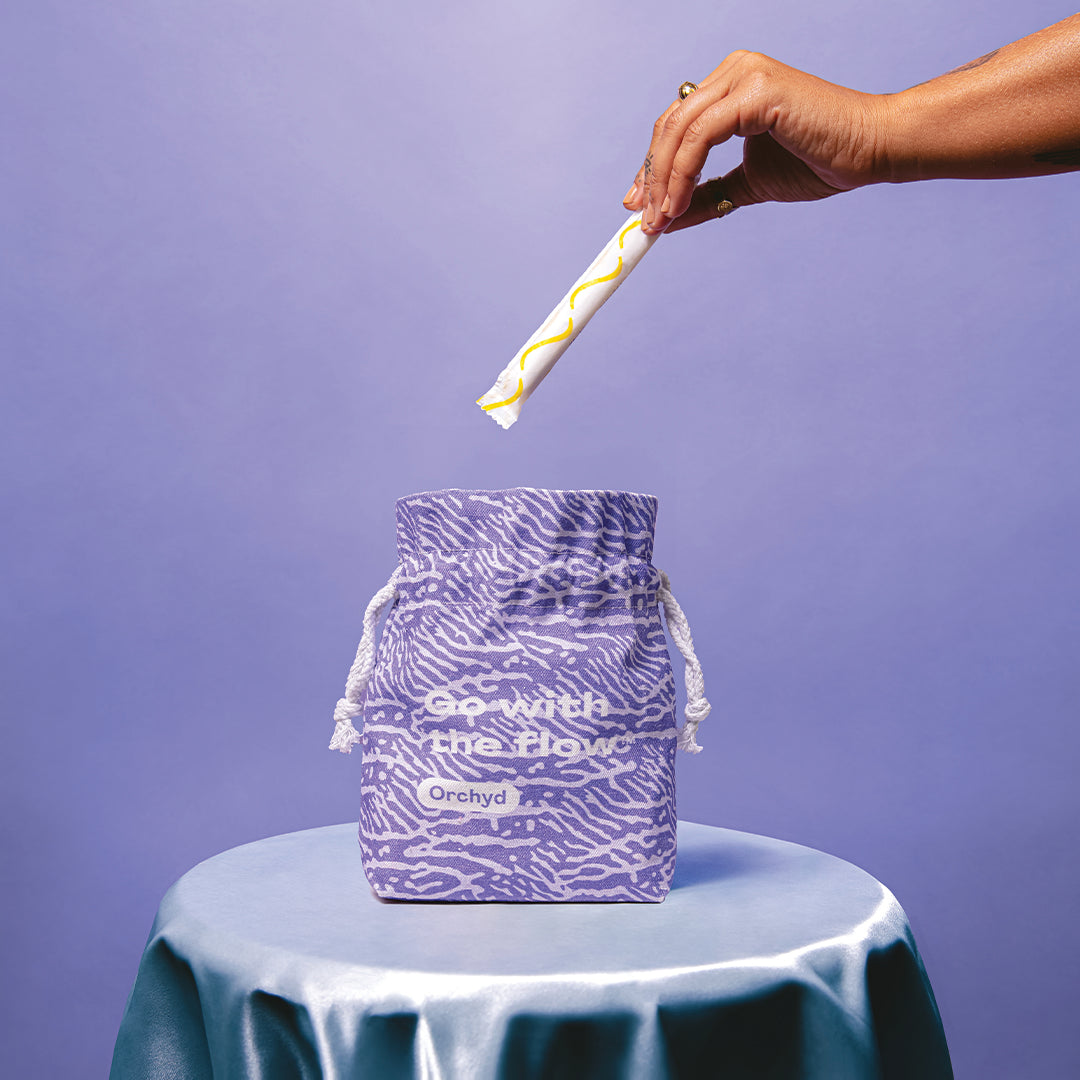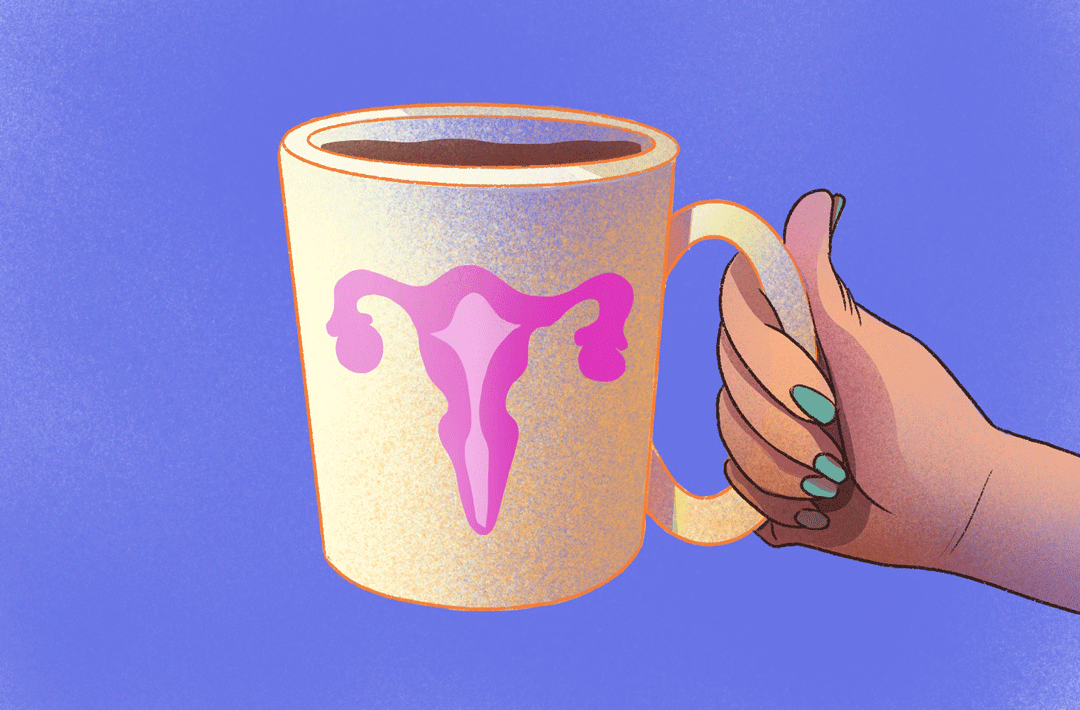Caffeine has a pretty obvious effect on our bodies; otherwise, we wouldn't give it so much daily responsibility to power us up. But could our morning helper actually be messing with our periods? The answer is: Kind of.
The Research & The Effects
In their study, "Caffeine Consumption and Menstrual Function" (1999), researchers recorded that of the 403 participants, individuals who drank more caffeine (300mg daily) were twice as likely to have shorter menstrual cycles compared to people who didn't drink coffee. Say what? Something I like to ingest daily can positively impact my life? That's a first (move over, ice cream). The study stated, "The mechanism by which caffeine may alter the duration of the menstrual cycle is not clear, but such an effect could occur via the effect of caffeine on sex hormones or the hormone receptors." A considered variable is that caffeine constricts the uterine blood vessels, allowing less blood to escape and making bleeding days lighter or less frequent.
However, never trust anything that sounds too good to be true. Though caffeine intake has one positive side effect on your period, most other side effects are pretty negative. Doctors often advise people to limit their intake rather than ramp it up. The constricting uterine blood vessels and the diuretic effects of caffeine can mean that too much caffeine intake can make cramps more painful and prolonged.
Caffeine & Your Hormones
Another thing to watch out for is how caffeine affects your hormones and moods. During your period, hormone fluctuations can lead to mood swings, anxiety, and weepiness, which are not symptoms most people want to exacerbate. For example, an extra shot of espresso can be good for staying up late to finish a project, but it's probably not the best when you're experiencing PMS symptoms and increased irritability from your period. If you're already feeling anxious and on edge, caffeine definitely will not help.
Caffeine & PMS Symptoms
But wait, there's more! Beyond its effects on hormones, caffeine's influence on our bodies extends even further. Let's delve deeper into some lesser-known ways caffeine interacts with our physiology, menstrual cycles, and symptoms.
Sleep Patterns
Firstly, have you ever noticed that your sleep patterns seem to be affected by your caffeine consumption? It's not just a coincidence. Caffeine is a notorious sleep disruptor, and its stimulating effects can linger in your system for hours. This can lead to difficulties falling asleep and even disrupted sleep throughout the night, so if you're tossing and turning, wondering why you can't seem to catch those Z's, that extra cup of coffee in the afternoon might be the culprit.
Hydration Levels
Moreover, caffeine doesn't just impact your sleep; it can also have a surprising connection to your hydration levels. We often think of beverages like coffee as contributing to our daily fluid intake, but caffeine's diuretic properties can actually lead to increased urination and potential dehydration, especially when consumed in large quantities. It's essential to balance your coffee habit with plenty of water to keep your body well-hydrated and functioning optimally.
Fertility
But back to the topic of periods and caffeine. While we've explored how caffeine can exacerbate certain period symptoms, there's another angle to consider: its potential influence on fertility. Some studies suggest that high caffeine intake might be associated with delayed conception or even a slightly higher risk of miscarriage. While the evidence isn't definitive, it's worth considering, especially if you're actively trying to conceive.
Breast Tenderness
Another interesting way caffeine affects your cycle is by making your breasts more tender than usual in the days leading up to your period. Doctors say that they actually prescribe cutting caffeine intake in half for people who experience excess breast pain on their cycle.
Period Diarrhea
Caffeine can also play a role in your period diarrhea. Many people experience digestive issues before or during their period, and coffee certainly doesn't help! Hormones produced by the cells in your womb during your period cause cramps and can also leak into your bowels, stimulating diarrhea. Caffeine on its own is a stimulant that speeds up digestion and can cause diarrhea, so the two working together is a perfect storm of blowing up in the bathroom at brunch.
So, although caffeine doesn't necessarily disrupt your menstrual cycle, it can greatly impact the symptoms you experience. Whether emotional or physical, caffeine can play a role in your period woes. And if you can't completely quit the cup, maybe consider limiting your intake during your period to alleviate some of your pesky symptoms.
Caffeine Alternatives
Maybe you’re a tough guy and interested in quitting coffee cold turkey. Below are some options to consider when replacing it. Just because you don’t drink coffee doesn’t mean you don’t deserve to hold a mug of hot liquid and curl up on the couch!
- Saffron Latte: Saffron, known for its mood-lifting properties, can be a menstruator's best friend. Infuse a warm cup of milk with a pinch of saffron threads and a touch of honey for a luxurious and calming beverage that can help alleviate cramps and improve your overall well-being. Check out the Warm Feelings Latte from The Fullest.
- Herbal Coffee: Herbal coffee offers a holistic alternative to traditional brews. It is not just a pick-me-up; it nurtures well-being and sharpens focus naturally. And the benefits span energy support, mood enhancement, and microbiome health. Check out the Herbal Coffee from Wooden Spoon Herbs.
- Herbal Teas: Don't underestimate the power of herbal teas like chamomile, ginger, and peppermint. They not only offer caffeine-free options but also bring relief from bloating and discomfort. Check out Moon Time Tea from Come Alive Herbals.
- Hot Water with Lemon: A simple yet effective choice, warm water with lemon helps with hydration and digestion, which can be especially beneficial during your period.
- Dark Chocolate: For a sweet treat, indulge in a small piece of dark chocolate. It contains less caffeine than milk chocolate and can satisfy your cravings.
Track Caffeine & Your Cycle
Tracking your menstrual cycle in the Orchyd app can provide valuable insights into the interplay between caffeine and your body's rhythms. By diligently logging your daily caffeine intake alongside mood fluctuations, energy levels, and PMS symptoms, you can uncover patterns that illuminate the effects of caffeine on your overall well-being.
Whether it's identifying days when that extra cup of coffee amplifies PMS irritability or recognizing how caffeine impacts sleep quality during specific cycle phases, the app becomes a personalized tool for informed decision-making. Armed with this knowledge, you can navigate your caffeine consumption with greater awareness, tailoring it to support a smoother cycle and minimize unwanted symptoms.
In conclusion, the relationship between caffeine and our bodies goes beyond the simple power-up we seek each morning. From its effects on menstrual cycles and mood swings to sleep disruption and hydration concerns, caffeine's impact is far-reaching. While moderate consumption might be a feasible option for many, being mindful of its potential drawbacks and adjusting your intake based on your body's signals can help you make the most of your caffeine experience. So, as you sip your next cup of coffee, remember that its effects extend beyond that momentary burst of energy – they can shape how you feel and function throughout the day.


